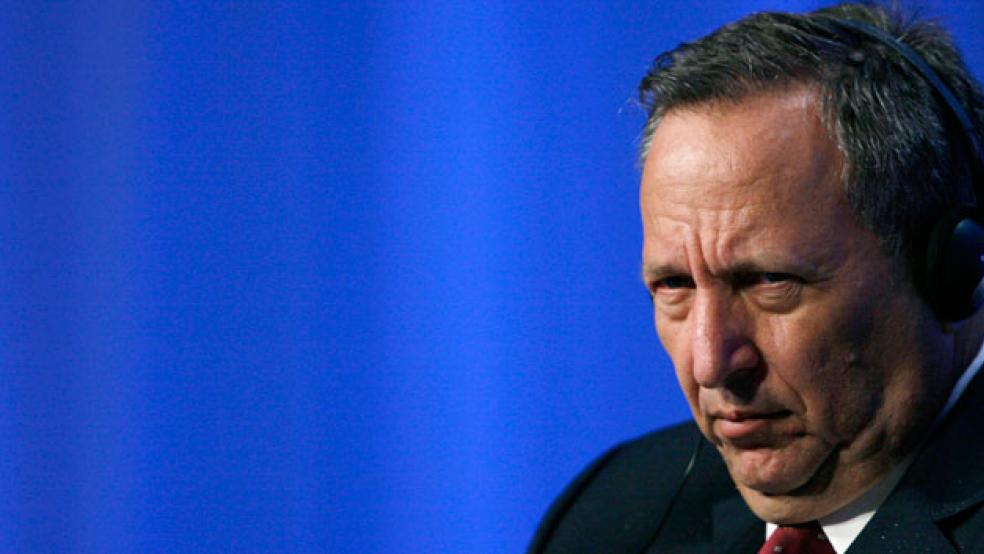President Obama’s backflip on Syria is a rare political misstep, but it’s not the only recent goof. The Obama White House, lauded for its crafty politics, has bungled big time the selection of the next Federal Reserve Chairman.
Once again speculation is rife that Larry Summers is the favored pick for the job; once again the blowback is intense. There is widespread (and reasonable) concern about Mr. Summers’ personality and policies. Most important, it is clear that Mr. Summers favors fiscal over monetary policy. In today’s world, relying on increased government spending to boost the economy is a non-starter.
This distraction comes at a terrible time. Focus on Fed policy is intense, with a prospective slowdown in the quantitative easing program already being felt across the globe, and with the re-regulation of our financial industry far from complete. We need a sober, respected leader who is able to corral the disparate members of the Fed Board into supporting a coherent monetary policy--Larry Summers is not that person.
Earlier this summer, the White House leaked that the former Treasury Secretary was the frontrunner to replace Ben Bernanke when the latter retires early next year. That trial balloon loudly fizzled. The resulting sniping severely damaged the two leading candidates for the job – Summers and Fed Vice Chair Janet Yellen -- and made the White House look amateurish.
Critics on the left and the right have been quick to pounce on a litany of past missteps from Summers, including most notably his musing over why women may be intellectually ill suited to pursue the sciences. Really, a four-year old would know better. Opponents to Summers portray him as outspoken, shooting from the hip, and not a consensus-builder. It seems exceedingly stupid to put a cowboy behind the wheel when the Federal Reserve has taken on an almost unprecedented role in driving our economy.
RELATED: SYRIAN DEBATE COULD OVERSHADOW KEY FISCAL ISSUES
Meanwhile, Janet Yellen, long considered the most likely successor to Bernanke, has now come in for her share of slings and arrows. Given Mr. Summer’s former misadventures with gender generalizations, the choice inevitably morphed into a women’s issue.
Hints of why Yellen might not “fit in” with the Obama financial team hark back to whisper campaigns about why a woman should not advance to the C-suite: she isn’t one of the team, she has her own opinions, she’s too professional in a setting where others, notably Tim Geithner, tend to fly by the seat of their pants. As Neil Irwin put it in The Washington Post, “She is methodical, not manic.” Seriously, that’s the kind of nonsense that’s out there.
Yellen may lean too far in support of boosting the economy and worry too little about creating bubbles, but her forecasting record has been better than most, and she was earlier than many of her colleagues in foreseeing the financial crisis. Notwithstanding widespread support for Yellen and Obama’s pro-women politics, however, new soundings give Summers the nod.
Unhappily, this sideshow is overshadowing the debate that should be taking place. Our financial brainiacs should be focused on whether this is the right time to withdraw the giant prop known as quantitative easing, and on completing our financial regulatory overhaul. A just-released report from the international Financial Stability Board (FSB) cites ongoing problems with U.S. oversight of systemic risk, gaps in how our insurance industry is regulated, and suggests “better supervision of financial market infrastructures” as well.
The report describes our oversight system as “complex and fragmented.” No kidding. The bureaucratic horror known as Dodd-Frank, responsible for reengineering our regulatory framework, is still evolving. So complex and poorly devised is that bill that three years in, it is nowhere near completion.
As of July 15, according to law firm Davis Polk, “a total of 279 Dodd-Frank rulemaking requirement deadlines have passed….[of which] 172 (61.6 percent) have been missed and 107 (38.4 percent) have been met with finalized rules.” The new Fed Chair will have to move this process along-- he or she will have to be a master politician to do so. As little as bankers want tough new regulations, they (and those needing credit) want continued uncertainty even less.
One notable feature of Dodd-Frank is the teamwork approach to monitoring market excesses, an activity assigned to the hydra-headed Financial Stability Oversight Council. Under Dodd-Frank, the FSOC was given “collective accountability for identifying risks and responding to emerging threats to financial stability.”
Imagine – a committee composed of the (often warring) heads of the 10 agencies that meets monthly for a couple of hours, is now responsible for spotting bubbles. Now imagine Larry Summers at the table. Improved collaboration is not the first thing that comes to mind.
Meanwhile, the Fed’s bond-buying program continues to dominate markets here and abroad. Market vulnerability to changing Fed maneuvers is real. The annual report from the Financial Stability Oversight Committee, released in April, explained that the market’s extra-low yields provide “incentives for market participants to “reach for yield” by increasing leverage, by engaging in maturity transformation, or by investing in less creditworthy assets, thus potentially increasing exposure to risks of sudden spikes in yields.”
In recent weeks, we have seen emerging markets pummeled by Bernanke’s proposed pullback from QE3. In a recent Financial Times piece, James Crabtree wrote, “fears of reduced US Federal Reserve quantitative easing have sent the rupee plunging, raising worries that Asia’s third-largest economy could be on the cusp of a genuine financial calamity.” India is not alone.
We need a Fed Chair that in the midst of this turmoil will command confidence and widespread support--Mr. Summers is just too risky.






